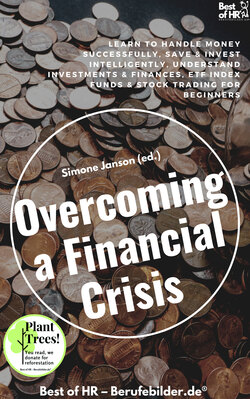Читать книгу Overcoming a Financial Crisis - Simone Janson - Страница 8
На сайте Литреса книга снята с продажи.
ОглавлениеEconomics and psychology: why we work more when hunger occurs
// By Professor Dr. Hanno Beck
E4 likes Tom Collins, Felsamisen and the real estate market. E4 is a rat. And it shows us why we are all a bit of economists.
Once Shopping Queen
Nina is called the Happy. Nina is from Hamburg. She has chosen a red evening dress, high heels and a handbag. Her tattoos - arms, hands, neck - work wonderfully in her look, as Guido explains.
Guido - that's Guido Maria Kretschmer, a German fashion designer, moderator and referee of the TV show “Shopping Queen”. Nina did it: With her look, she was voted Shopping Queen 2013, won a crown, a trip for two to the fashion metropolis of New York, 1000 euros of shopping money and tickets for New York Fashion Week.
More bang for the buck
The TV format “Shopping Queen” is simple and entertaining: every week five women compete against each other for five consecutive days. Your task: to dress and style yourself with a predetermined amount of money, as tastefully and elegantly as possible according to a given motto. Afterwards, every outfit is evaluated by all participants and by Guido, the lady with the highest score becomes the shopping queen.
Before you dismiss this format, which is ridiculed as “reality TV”, as a lower-layer television, a look at the rules of the game: you get a fixed amount X and have to spend it with it - that is, spend the little money so that you achieve the greatest possible effect. More bang for the buck, as the Anglo-Saxons say - more boom for the well-earned coal.
Economy accompanies us through life
Do you know that? Of course, everyone knows this, which starts with the pocket money: you are in the supermarket and considered how to spend the ten euro pocket money sensibly - ice or chocolate? Or both? And if both, in what proportion? Eight euros for chocolate, two for ice cream? Half half?
This problem accompanies us throughout our lives: we have to get along with a given income, a fixed amount of money - economists speak of a budget - and how to best divide this budget into the many wishes we want to fulfill.
The household theory
In the economic world, this problem is examined under the heading "Household Theory", and economists understand the art of describing simple problems in a complicated way:
To maximize the benefit ... an individual will buy such quantities of goods ... for which the psychic exchange rate between two goods (the marginal rate of substitution) is equal to the rate at which the two goods are exchanged.
It takes time and leisure to digest this chewing glare, only right when the whole is garnished with formulas and colorful graphics. And even if you understand it, who believes that? And above all: Who is this?
E4 - the rat that can count
Someone who behaves like that is in Texas. At Animal Laboratories, Texas AundM University and Washington University. There, between sterile corridors, rows of cages under neon light, John H. Kagel, Raymond C. Battalio and Leonard Green have exposed the elementary ideas of microeconomists to the reality test - are the ideas of economists close to life? Are you? And the witnesses wear fur. Or feathers.
Animals offer an easy way to test elementary economic principles, say the three researchers: You can repeat experiments, observe, change, you can reward the subjects - sorry, animals - and punish - many things that you can not easily with human subjects at least not without landing in front of the prosecutor or in the Bild newspaper.
More work when hungry?
For example, the researchers can test whether their proteges work more when they are hungry. Or whether they risk more when the feed bowl is empty. Or whether the support of the social welfare office leads them to work less.
Even if this is not nice - with rats and pigeons, one can do experiments that bend with humans. But if rats and pigeons follow the apprentices' theories of economists, does it mean that we know how people behave? Can the behavior of animals be transferred to humans?
Economic laws in the cage
Hard to say. The researchers argue differently: If simple ideas fail in economic experiments, why should they work in a much more complex world beyond the cages?
Animal experiments are, so to speak, an attempt to refute economic theories - if animals do not stick to them, then why people? So how do you test complicated economic hypotheses on animals? How would you describe that? Let's design an experiment. Let's take rats.
An unconditional basic income
For example, a rat named E4. Researchers are a little sentimental - while we give our animals lovely names - treasure, darling, hasi, angels or mistvieh - animals, the actual stars of the experiments, are only given with letters and numbers in scientific papers. A little heartless.
But back to E4. First, we give E4, a stately rat, free, unlimited access to normal feed and water, an unconditional basic income.
But a little luxury must be, so E4 has the choice between two other drinks: Root Beer - a terribly sweet, alcohol-free blend of herbal and root extracts - and a Tom Collins mix, which is a cocktail of lemon juice and sugar syrup. The gin, which usually refines this mix, we leave for obvious reasons.
Text comes from: Das Leben ist ein Zoo: Geschäftstüchtige Affen, gefiederte Panzerknacker und Fische in der Waschstraße. Die erstaunlichen Parallelen zwischen Mensch und Tier (2015) by Professor Dr. Hanno Beck, published by FAZ Verlag, Reprints by friendly permission of the publisher.
